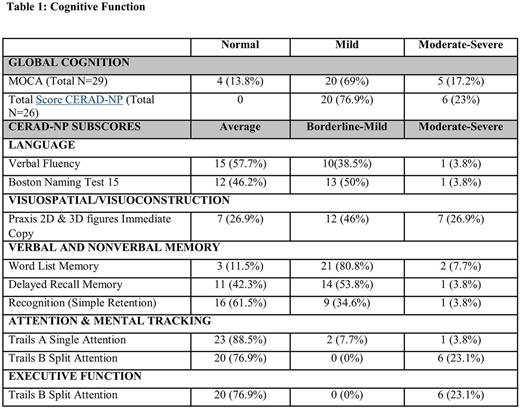Abstract
Background: Mild cognitive impairment is common with increasing age and can contribute to an increased risk of cognitive deficits that impair function and independence. Comprehensive geriatric assessment (CGA) predict treatment toxicity and tolerance in hematological malignancies. We utilized CGA and neuropsychological testing to describe vulnerabilities in a group of older adults awaiting autologous and allogeneic hematopoietic cell transplant (HCT).
Methods: From August 2016 to June 2017, 30 consecutive patients ≥ 60 years with hematological malignancies who were considered for HCT completed CGA and neuropsychological assessment at the University of Nebraska Medical Center. Measures of cognitive functioning included a standardized battery of neuropsychological tests [Consortium to Establish a Registry for Alzheimer's Disease Neuropsychological Battery-CERAD-NP)] and Montreal Cognitive Test (MOCA). Patients completed Geriatric Depression Scale-15 (GDS-15), and carepartners completed a Collateral Source version of the GDS.
Results: Patients had a median age of 69 years (range 61-78). MOCA and CERAD-NP were completed in 29 and 26 patients, respectively. Twenty patients met criteria for cognitive impairment and 6 patients met criteria for moderate-severe impairment (Table 1). Patients primarily displayed impairment in language, verbal and non-verbal memory, and >20% showed moderate-severe impairment in attention, executive functioning and visuospatial/visuoconstruction. Patients report a median of 3 (range of 0-8) symptoms on the GDS-15. 15% met criteria for depression, whereas 30% met criteria for depression based on reports from carepartners. Over 45% of patients have both impaired physical functioning on the Short Physical Performance Battery (SPPB <8) and cognitive impairment. One fourth of the patients have both cognitive impairment and one or more impairments in instrumental activities of daily living (IADL). In a subset of patients with HCT-CI score of 0-2, 34.5% met criteria for cognitive impairment, 25% had SPPB <8 and 31% had 1 or more impairments in IADL.
Conclusions: Older patients with hematological malignancies, including those with HCT-CI score of 0-2 have a high prevalence of cognitive and functional impairment. Impaired memory and executive functioning have implications for their ability to adhere to complex medication regimens after HCT. Carepartners report more depressive symptoms suggesting that patients may be minimizing depressive symptoms. One fourth of patients are at high risk for further cognitive decline and disability due to preexisting cognitive impairment and impairment in IADLs. Prospective longitudinal studies are needed to better understand the trajectory and profile of cognitive changes in older HCT survivors and the impact of these cognitive changes on life activities and quality of life.
Wildes: Janssen: Consultancy; Carevive Systems Inc: Consultancy.
Author notes
Asterisk with author names denotes non-ASH members.


This feature is available to Subscribers Only
Sign In or Create an Account Close Modal